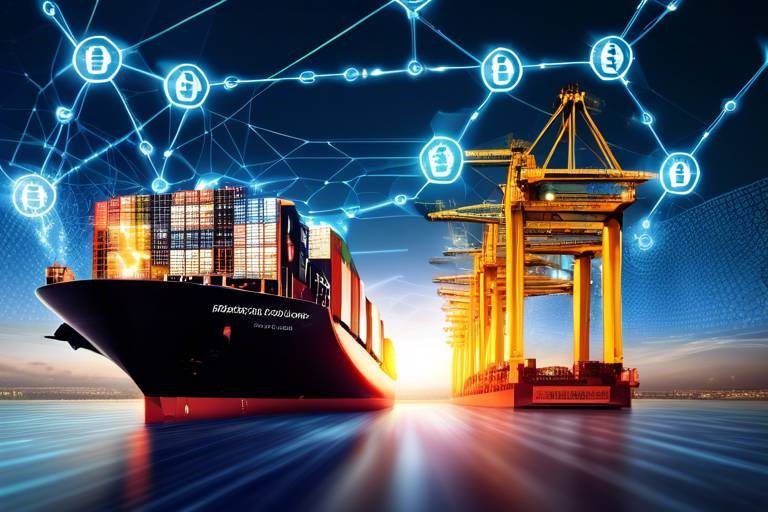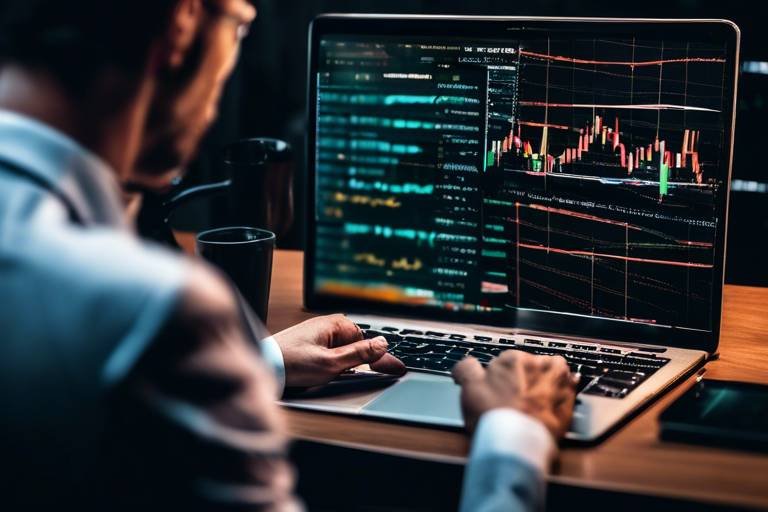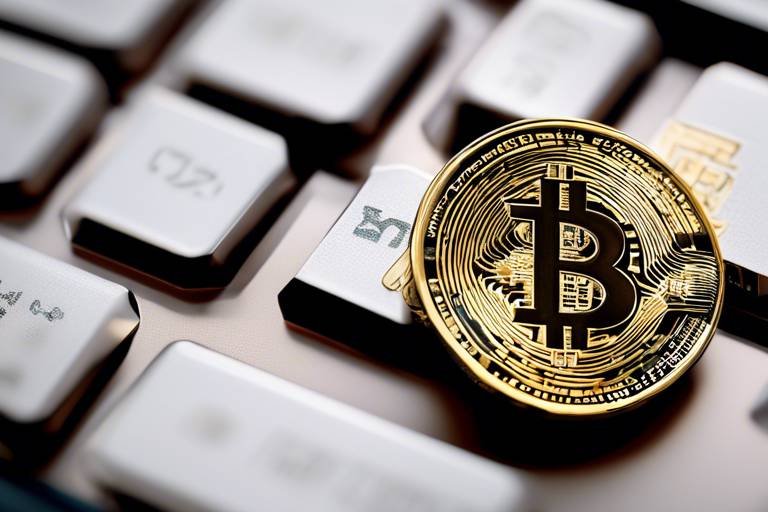The Role of Blockchain in Enhancing Global Trade
In today's fast-paced world, the landscape of global trade is undergoing a remarkable transformation, thanks to the advent of blockchain technology. Imagine a world where transactions are not only swift but also secure and transparent. Blockchain is not just a buzzword; it’s a revolutionary approach that is changing how businesses operate across borders. By providing a decentralized ledger that records transactions in an immutable way, blockchain is paving the way for a new era of trust and efficiency in trade.
So, what exactly does this mean for global trade? First off, it enhances transparency. In traditional trading systems, the lack of visibility often leads to misunderstandings, disputes, and even fraud. However, with blockchain, every transaction is recorded and visible to all parties involved. This means that everyone from manufacturers to consumers can track the movement of goods in real-time, thereby fostering a sense of trust and accountability. Just think about it: if you could see the entire journey of a product from its origin to your doorstep, wouldn’t you feel more confident about your purchase?
Moreover, blockchain significantly reduces the risk of fraud. In a world where counterfeit goods and deceptive practices are rampant, the secure nature of blockchain acts as a formidable barrier against such threats. By utilizing smart contracts—self-executing contracts with the terms directly written into code—businesses can ensure that conditions are met before a transaction is completed. This not only minimizes the chances of fraud but also automates processes, making transactions smoother and faster.
Another critical aspect is how blockchain streamlines supply chains. The complexity of modern supply chains can be overwhelming, with multiple parties involved at various stages. Blockchain technology offers end-to-end visibility, allowing businesses to monitor their supply chains like never before. This means faster logistics, reduced delays, and ultimately, a more efficient trading process. Imagine being able to pinpoint exactly where a shipment is at any given moment—this capability can significantly enhance operational efficiency.
However, as with any groundbreaking technology, the implementation of blockchain in global trade is not without its challenges. Regulatory hurdles and interoperability issues can pose significant obstacles. Different countries have varying regulations regarding blockchain technology, which can complicate international transactions. Additionally, for blockchain to reach its full potential, systems need to be interoperable, allowing different blockchain networks to communicate with one another seamlessly. Addressing these challenges will be crucial for the widespread adoption of blockchain in global trade.
In conclusion, the role of blockchain in enhancing global trade is profound and multifaceted. By increasing transparency, reducing fraud, and streamlining supply chains, blockchain is not just a technological advancement; it’s a catalyst for a more efficient and secure trading environment. As we move forward, it’s exciting to think about the possibilities that lie ahead and how this technology will continue to shape the future of global commerce.
- What is blockchain technology? Blockchain is a decentralized digital ledger that records transactions across many computers securely and transparently.
- How does blockchain enhance transparency in trade? By providing an immutable record of transactions, all parties can access real-time data, fostering trust and minimizing disputes.
- What are smart contracts? Smart contracts are self-executing contracts with the terms of the agreement directly written into code, which helps automate processes and reduce fraud.
- What challenges does blockchain face in global trade? Challenges include regulatory hurdles, interoperability issues, and the need for widespread adoption across different regions.

Understanding Blockchain Technology
Blockchain technology can be a bit like a digital ledger that everyone can see but no one can change. Imagine a huge book that records every transaction made, where each page is linked to the previous one in a way that if someone tried to alter a single page, it would be immediately obvious to everyone else. This is the fundamental essence of blockchain—it’s a decentralized and immutable ledger that ensures the integrity of data across a network of computers.
At its core, blockchain operates on a few key principles. First, it uses a network of computers, often referred to as nodes, to verify and record transactions. When a transaction occurs, it gets bundled with others into a block. Once this block is filled, it’s added to the existing chain of blocks—hence the name "blockchain." This process is secured through cryptography, making it nearly impossible for any single party to manipulate the data without consensus from the majority of the network.
The beauty of blockchain lies in its transparency and security. Every participant in the network can access the same information in real-time, which eliminates discrepancies and builds trust among users. This is particularly important in global trade, where multiple parties, including suppliers, manufacturers, and logistics providers, need to coordinate seamlessly. With blockchain, everyone can track the movement of goods and verify their authenticity without relying on a central authority.
To illustrate how blockchain works in global trade, consider the following key components:
- Decentralization: Unlike traditional systems that depend on a central authority, blockchain distributes control among all participants, reducing the risk of fraud and corruption.
- Immutability: Once a transaction is recorded on the blockchain, it cannot be altered or deleted. This ensures that all records are permanent and trustworthy.
- Transparency: All parties have access to the same information, which fosters collaboration and minimizes misunderstandings.
In summary, understanding blockchain technology is crucial for grasping its transformative potential in global trade. By providing a secure, transparent, and efficient way to track transactions, blockchain is not just a technological innovation; it’s a game changer for how businesses operate across borders. As more companies recognize its benefits, the landscape of global trade is set to become more connected and reliable than ever before.

Benefits of Blockchain in Trade
The implementation of blockchain technology in trade is nothing short of a game-changer. Imagine a world where every transaction is not only secure but also transparent and efficient. This is the promise of blockchain, a digital ledger that records transactions across multiple computers, ensuring that the data cannot be altered retroactively without the alteration of all subsequent blocks. The benefits are vast, and they can transform how businesses operate on a global scale.
One of the most significant advantages of blockchain in trade is its ability to enhance efficiency. Traditional trade processes often involve numerous intermediaries, leading to delays and increased costs. With blockchain, the need for these middlemen is drastically reduced. For instance, when a manufacturer ships goods, they usually have to deal with banks, customs, and logistics providers. Blockchain streamlines this process by allowing all parties to access the same information simultaneously, reducing the time it takes to complete transactions and thereby cutting costs.
Moreover, blockchain enhances security. In a world where cyber threats are rampant, having a secure method of transaction is crucial. Blockchain's decentralized nature means that no single entity has control over the entire chain, making it nearly impossible for hackers to compromise the system. Each transaction is recorded with a unique cryptographic signature, ensuring that only authorized parties can access sensitive information. This level of security is particularly vital in industries such as finance and pharmaceuticals, where the stakes are incredibly high.
Another noteworthy benefit is increased transparency. With blockchain, every transaction is recorded in real-time, creating an immutable record that all stakeholders can access. This transparency fosters trust among participants in the supply chain, as everyone can verify the authenticity of the products being traded. For example, in the food industry, blockchain can track the journey of a product from farm to table, ensuring that consumers receive safe and high-quality goods. This level of visibility not only builds trust but also minimizes disputes and enhances accountability.
To illustrate these benefits, consider a scenario where a company uses blockchain to manage its supply chain. Each step of the process—from production to shipping to delivery—is recorded on the blockchain. If a shipment is delayed, all parties can see where the holdup occurred, allowing for quicker resolutions. This end-to-end visibility is invaluable in today’s fast-paced trade environment, where delays can lead to significant financial losses.
However, while the benefits are substantial, it’s essential to acknowledge that the transition to blockchain is not without its challenges. Companies must invest in the necessary technology and training to ensure that their staff can effectively use this new system. Additionally, regulatory frameworks are still catching up to the rapid advancements in technology, which can create uncertainty for businesses looking to adopt blockchain.
In summary, the benefits of blockchain in trade are profound. From enhancing efficiency and security to increasing transparency and accountability, the technology has the potential to revolutionize how businesses operate globally. As more companies recognize these advantages, we can expect to see a significant shift in the landscape of global trade, paving the way for a more connected and efficient marketplace.
- What is blockchain technology?
Blockchain is a decentralized digital ledger that records transactions across multiple computers, ensuring security and transparency. - How does blockchain improve efficiency in trade?
By reducing the need for intermediaries and allowing real-time access to information, blockchain streamlines processes and cuts costs. - Is blockchain secure?
Yes, blockchain is highly secure due to its decentralized nature and the use of cryptographic signatures for transactions. - What industries can benefit from blockchain?
Industries such as finance, pharmaceuticals, and food supply chains can significantly benefit from the transparency and security that blockchain offers.

Increased Transparency
In the ever-evolving landscape of global trade, transparency has become a buzzword that everyone seems to be talking about. But what does it really mean, and why is it so crucial? Imagine a world where every transaction is recorded on a public ledger, visible to all parties involved. This is precisely what blockchain technology offers—a way to ensure that every trade is not only documented but also accessible in real-time. With blockchain, businesses can track the journey of their products from the point of origin to the final consumer, creating a level of visibility that was previously unimaginable.
One of the most significant advantages of this transparency is the ability to foster trust among stakeholders. When all parties can see the same information, it minimizes the potential for disputes. For instance, if a shipment is delayed, everyone involved can access the same data regarding its status, eliminating the blame game that often occurs in traditional supply chains. This shared visibility creates a collaborative environment where issues can be resolved quickly and efficiently.
Moreover, the immutable nature of blockchain records means that once a transaction is entered, it cannot be altered or deleted. This feature is akin to having a digital fingerprint for every trade, ensuring that the history of each transaction is preserved and can be audited at any time. In an industry plagued by fraud and misrepresentation, this level of accountability is invaluable. Companies can confidently assure their customers that the products they are purchasing are authentic and ethically sourced.
To illustrate the impact of increased transparency, consider the following key points:
- Real-Time Data Access: Stakeholders can monitor transactions in real-time, leading to quicker decision-making.
- Enhanced Trust: With shared access to information, trust among partners is significantly strengthened.
- Dispute Resolution: Transparency reduces the likelihood of disputes and streamlines resolution processes.
- Accountability: Immutable records hold all parties accountable for their actions, deterring fraudulent behavior.
In summary, the increased transparency provided by blockchain technology is not just a nice-to-have; it is a game changer for global trade. By enabling all parties to access the same information, blockchain fosters an environment of trust and collaboration that is essential for successful international transactions. As we move forward, businesses that embrace this technology will likely find themselves at a competitive advantage, equipped with the tools necessary to navigate the complexities of modern trade.

Reducing Fraud Risks
In the fast-paced world of global trade, fraud is a persistent threat that can disrupt supply chains and erode trust among trading partners. However, the advent of blockchain technology is changing the game. By providing a secure and traceable environment for transactions, blockchain significantly mitigates the risk of fraud. Imagine a world where every transaction is recorded in an immutable ledger, visible to all parties involved. This transparency is not just a dream; it's a reality made possible by blockchain.
One of the standout features of blockchain is its use of smart contracts. These are self-executing contracts with the terms of the agreement directly written into code. When certain conditions are met, the contract automatically executes the transaction, eliminating the need for intermediaries. This process not only speeds up transactions but also reduces the chances of human error or manipulation, which are common in traditional contract processes. For instance, if a shipment of goods is confirmed to have arrived at its destination, the smart contract can instantly trigger payment to the supplier, ensuring that all parties are held accountable.
Moreover, blockchain's ability to create a transparent trail of transactions enhances verification processes. Each step in the supply chain can be recorded on the blockchain, allowing stakeholders to trace the origin of goods and confirm their authenticity. This is particularly crucial in industries like pharmaceuticals or luxury goods, where counterfeit products can have devastating consequences. By leveraging blockchain, companies can provide proof of authenticity, assuring consumers that they are receiving genuine products. This not only protects businesses but also builds trust with customers.
To further illustrate the impact of blockchain on fraud reduction, consider the following table that highlights key features of blockchain technology that contribute to fraud prevention:
| Feature | Description |
|---|---|
| Decentralization | Eliminates single points of failure and reduces the risk of data tampering. |
| Immutability | Once data is recorded, it cannot be altered without consensus, ensuring data integrity. |
| Transparency | All transactions are visible to authorized parties, fostering trust and accountability. |
| Smart Contracts | Automates and enforces agreements, reducing reliance on intermediaries and minimizing fraud risk. |
In conclusion, the integration of blockchain technology into global trade is a powerful antidote to the pervasive issue of fraud. By enhancing transparency, utilizing smart contracts, and creating an immutable record of transactions, blockchain not only protects businesses but also fosters a more trustworthy trading environment. As more companies recognize these benefits and adopt blockchain solutions, we can expect to see a significant reduction in fraudulent activities across the globe, paving the way for a more secure and efficient trade landscape.

Streamlining Supply Chains
In today's fast-paced global market, the efficiency of supply chains can make or break a business. Imagine a world where every step of the supply chain is visible and traceable, where delays and errors are minimized, and where trust among partners is strengthened. This is where blockchain technology comes into play, revolutionizing how goods move from point A to point B. By providing an immutable and transparent ledger of transactions, blockchain allows all stakeholders—from manufacturers to retailers—to access real-time data, which is crucial for making informed decisions.
One of the key advantages of using blockchain in supply chains is the ability to enhance collaboration among various parties involved. With traditional systems, information is often siloed, leading to miscommunication and inefficiencies. However, with blockchain, everyone can see the same data at the same time, which fosters a sense of shared responsibility and accountability. This transparency not only helps in reducing disputes but also accelerates the resolution of issues when they arise.
Moreover, blockchain enables the automation of processes through smart contracts. These self-executing contracts automatically enforce the terms of an agreement once predefined conditions are met. For instance, if a shipment is delayed, the smart contract can automatically trigger penalties or compensation without the need for manual intervention. This level of automation not only speeds up transactions but also significantly reduces administrative costs.
Furthermore, blockchain's ability to provide end-to-end visibility can lead to better inventory management. Companies can track their products in real-time, from production to delivery, allowing them to optimize stock levels and reduce excess inventory. This is particularly beneficial in industries that deal with perishable goods, where timing is critical. A study by the World Economic Forum indicated that blockchain could reduce food waste by up to 50% by improving traceability and accountability in the supply chain.
To illustrate the impact of blockchain on supply chains, consider the following table that outlines key benefits:
| Benefit | Description |
|---|---|
| Enhanced Visibility | Real-time tracking of goods throughout the supply chain. |
| Improved Efficiency | Reduction in delays and errors due to automated processes. |
| Cost Reduction | Lower administrative costs through smart contracts and streamlined processes. |
| Increased Trust | Transparency fosters stronger relationships among stakeholders. |
In conclusion, the integration of blockchain technology into supply chains is not just a trend; it is a transformative shift that can lead to significant improvements in efficiency, cost-effectiveness, and trust. As businesses continue to adapt to the evolving landscape of global trade, those who embrace blockchain will likely find themselves at the forefront of innovation, ready to tackle the challenges of tomorrow’s marketplace.
- What is blockchain technology? Blockchain is a decentralized digital ledger that records transactions across many computers in a way that the registered transactions cannot be altered retroactively.
- How does blockchain improve supply chain management? It enhances visibility, increases efficiency through automation, and fosters trust among stakeholders by providing real-time, transparent data.
- Are there any challenges in implementing blockchain in supply chains? Yes, challenges include regulatory hurdles, the need for industry-wide standards, and interoperability with existing systems.
- Can small businesses benefit from blockchain technology? Absolutely! Small businesses can leverage blockchain to improve their operational efficiency, reduce costs, and enhance customer trust.

Challenges of Implementing Blockchain
While blockchain technology holds immense potential for transforming global trade, its implementation is not without challenges. One of the primary hurdles is the regulatory landscape. Governments around the world are still grappling with how to regulate blockchain technologies. Different countries have varying degrees of acceptance and legal frameworks, which can create confusion and uncertainty for businesses looking to adopt blockchain. For instance, while some nations are actively promoting blockchain initiatives, others remain skeptical, leading to a fragmented environment that complicates international trade.
Another significant challenge is interoperability. With numerous blockchain platforms available, each with its unique protocols and functionalities, the lack of standardization can hinder seamless integration across systems. Imagine trying to communicate in different languages without a common tongue; that’s how businesses feel when faced with multiple blockchain solutions. The absence of a unified framework can lead to inefficiencies and increased costs, as companies may need to invest in multiple systems to communicate effectively.
In addition, scalability is a pressing issue. As the volume of transactions grows, many existing blockchain networks struggle to keep up. For example, Bitcoin and Ethereum have faced criticism for their slow transaction speeds and high fees during peak times. This raises a critical question: can blockchain technology scale to meet the demands of global trade? If not, businesses may hesitate to adopt it, fearing that it won't support their needs as they expand.
Moreover, the cost of implementation can be daunting. Transitioning to a blockchain-based system often requires significant investment in technology and training. Companies must not only purchase the necessary hardware and software but also allocate resources for educating employees about how to use the new system effectively. This can be particularly challenging for small and medium-sized enterprises (SMEs) that may lack the financial resources to make such a leap.
Lastly, there is the challenge of data privacy. While blockchain is known for its transparency, this can sometimes conflict with the need for confidentiality in business transactions. Companies must find a balance between sharing necessary information for transparency and protecting sensitive data from competitors. This delicate dance can complicate how businesses approach blockchain adoption.
In summary, while the potential benefits of blockchain in global trade are substantial, businesses must carefully navigate the challenges of regulations, interoperability, scalability, costs, and data privacy. Overcoming these obstacles will be crucial for realizing the full potential of blockchain technology in enhancing global trade.
- What is blockchain technology?
Blockchain technology is a decentralized ledger system that records transactions across many computers in a way that ensures the security and transparency of the data.
- How does blockchain enhance global trade?
Blockchain enhances global trade by increasing transparency, reducing fraud, and streamlining processes, which leads to more efficient and secure transactions across borders.
- What are the main challenges of implementing blockchain?
The main challenges include regulatory hurdles, interoperability issues, scalability problems, high implementation costs, and concerns about data privacy.
- Are there successful examples of blockchain in trade?
Yes, several companies have successfully implemented blockchain technology to improve their trading processes, leading to increased efficiency and reduced costs.
- What does the future hold for blockchain in global trade?
The future of blockchain in global trade is promising, with emerging trends indicating increased adoption and innovation in the technology.

Case Studies of Blockchain in Trade
When it comes to the practical implementation of blockchain technology in global trade, real-world examples illuminate its transformative potential. Companies across various sectors are increasingly adopting blockchain solutions to enhance transparency, improve efficiency, and reduce costs. One standout case is that of **Maersk**, the world's largest container shipping company, which partnered with IBM to create **TradeLens**, a blockchain-based shipping platform. This innovative platform allows all stakeholders in the shipping process—from port operators to customs authorities—to access a shared, immutable record of transactions. By doing so, it eliminates the need for manual paperwork and reduces the risk of errors, ultimately speeding up the entire shipping process.
Another compelling example is the **Walmart** and **IBM** collaboration, which focuses on food safety. By utilizing blockchain, Walmart can trace the origin of its food products in seconds, a process that used to take days. This capability not only enhances food safety but also builds consumer trust. When a food safety issue arises, Walmart can quickly identify the source of contaminated products, ensuring swift action to protect consumers. The transparency provided by blockchain technology in this case is a game-changer for the food supply chain.
Furthermore, the **Diamond Industry** has also begun to leverage blockchain for authenticity and traceability. Companies like **Everledger** are using blockchain to create a digital ledger for diamonds, ensuring that each stone's origin is recorded and verified. This initiative combats the issue of conflict diamonds and allows consumers to make informed purchasing decisions. The transparency provided by blockchain not only protects ethical sourcing but also adds value to the diamonds themselves.
In the realm of finance, **Ripple** has made significant strides in using blockchain technology to facilitate cross-border payments. By enabling real-time transactions with lower fees, Ripple has become a preferred choice for financial institutions looking to optimize their international payment systems. The speed and efficiency of transactions on the Ripple network highlight how blockchain can revolutionize traditional banking processes.
These case studies illustrate just a few of the many ways blockchain is reshaping global trade. However, the journey is not without its challenges. As companies navigate the complexities of implementing blockchain, they must also address regulatory hurdles and ensure interoperability between different systems. Despite these obstacles, the potential benefits of blockchain are too significant to ignore, making it a crucial area of focus for businesses aiming to thrive in the modern marketplace.
- What is blockchain technology? Blockchain is a decentralized digital ledger that records transactions across multiple computers in a way that the registered data cannot be altered retroactively.
- How does blockchain enhance transparency in trade? Blockchain provides an immutable record of transactions that all parties can access in real-time, fostering trust and minimizing disputes.
- What are some challenges of implementing blockchain in global trade? Key challenges include regulatory hurdles, interoperability issues, and the need for widespread adoption among stakeholders.
- Can blockchain reduce fraud in trade? Yes, the secure and traceable nature of blockchain significantly reduces fraud risks by enabling smart contracts and thorough verification processes.
- What are the future trends of blockchain in trade? Future trends may include increased regulatory clarity, more partnerships between companies, and greater integration of blockchain with other technologies like AI and IoT.

Major Companies Adopting Blockchain
In the rapidly evolving landscape of global trade, several major companies have recognized the transformative potential of blockchain technology. These organizations are not just dipping their toes in the water; they are diving in headfirst, integrating blockchain into their operations to enhance efficiency, security, and transparency. For instance, IBM has been a pioneer in this space with its IBM Food Trust initiative, which utilizes blockchain to track the journey of food products from farm to table. By doing so, they ensure food safety, reduce waste, and enhance consumer trust.
Another significant player is Walmart, which has implemented blockchain to trace the origins of its food products. This initiative allows the company to respond swiftly to food safety issues, thereby protecting consumers and maintaining brand integrity. Imagine being able to trace a contaminated product back to its source in seconds rather than days! This level of transparency is a game changer in the industry.
Maersk, the world's largest container shipping company, is also making waves with its blockchain efforts. Through a partnership with IBM, Maersk is working on a platform called TradeLens, which aims to improve the efficiency of global shipping by digitizing and sharing shipping data among all stakeholders. This not only reduces paperwork but also minimizes the risk of errors and fraud, making international shipping smoother than ever.
Moreover, De Beers, a leader in the diamond industry, is leveraging blockchain to ensure the provenance of its diamonds. By using blockchain technology, De Beers provides a verifiable record of a diamond's journey from mine to market, effectively combating the trade of conflict diamonds and enhancing consumer confidence.
These examples illustrate just a few of the major companies that are spearheading the adoption of blockchain in trade. The benefits they are reaping include not only operational efficiencies but also a significant boost in trust among consumers and partners alike. As more companies recognize these advantages, we can expect to see a broader acceptance of blockchain technology across various sectors.
In summary, the adoption of blockchain technology by these major players showcases a vital shift towards more transparent and secure global trade practices. As the technology matures, it will undoubtedly pave the way for a more interconnected and efficient trading environment.
- What is blockchain technology?
Blockchain is a decentralized digital ledger that records transactions across many computers in such a way that the registered transactions cannot be altered retroactively, ensuring security and transparency.
- How does blockchain enhance global trade?
Blockchain enhances global trade by increasing transparency, reducing fraud, and streamlining processes, which leads to more efficient and secure transactions across borders.
- Which companies are using blockchain?
Major companies like IBM, Walmart, Maersk, and De Beers are leading the way in adopting blockchain technology to improve their operations and enhance trust in their supply chains.
- What are the challenges of implementing blockchain?
Challenges include regulatory hurdles, interoperability issues, and the need for industry-wide standards to facilitate widespread adoption.

Future Trends in Blockchain and Trade
As we look ahead, the intersection of blockchain technology and global trade is set to undergo a transformative evolution. The rapid pace of technological advancements coupled with the increasing demand for more efficient and secure trading processes is paving the way for exciting trends that are likely to reshape the landscape of international commerce. One of the most significant trends is the growing adoption of decentralized finance (DeFi) solutions. These platforms are designed to eliminate intermediaries, allowing for direct transactions between parties. Imagine a world where you can trade goods without the need for banks or brokers—this is becoming a reality!
Moreover, the integration of Internet of Things (IoT) devices with blockchain will enhance the tracking and monitoring of goods throughout the supply chain. Picture this: a shipment of fresh produce equipped with sensors that communicate its location and condition in real-time. This level of visibility not only boosts efficiency but also ensures that products are delivered in optimal condition, reducing waste and increasing consumer satisfaction.
Another trend to watch is the rise of smart contracts in facilitating trade agreements. These self-executing contracts with the terms of the agreement directly written into code will automate processes, reducing the time and cost associated with traditional contract management. For example, a smart contract could automatically release payment once goods are delivered and verified, minimizing disputes and enhancing trust among trading partners.
Additionally, as regulatory frameworks evolve, we can expect to see an increase in collaborative platforms that utilize blockchain for compliance and reporting. These platforms will not only streamline regulatory processes but also enhance transparency in trade, making it easier for businesses to adhere to international standards. The potential for a global blockchain-based trade network is on the horizon, which could revolutionize how countries interact economically.
However, with these advancements come challenges that must be addressed. Issues such as data privacy, scalability, and the need for standardized protocols will require attention from stakeholders across the board. The future of blockchain in trade is bright, but it will take collaboration and innovation to fully realize its potential.
- What is blockchain technology?
Blockchain is a decentralized ledger technology that allows for secure and transparent transactions across various industries, including trade. - How does blockchain enhance global trade?
By increasing transparency, reducing fraud, and streamlining processes, blockchain technology facilitates more efficient and secure cross-border transactions. - What are smart contracts?
Smart contracts are self-executing contracts with the terms directly written into code, which automate processes and reduce the need for intermediaries. - What challenges does blockchain face in global trade?
Challenges include regulatory hurdles, interoperability issues, and the need for standardized protocols. - What future trends can we expect from blockchain in trade?
Future trends include greater adoption of decentralized finance, integration with IoT devices, and the rise of collaborative platforms for compliance and reporting.
Frequently Asked Questions
- What is blockchain technology?
Blockchain technology is a decentralized digital ledger that records transactions across multiple computers. This ensures that the recorded transactions cannot be altered retroactively, enhancing security and transparency.
- How does blockchain enhance global trade?
Blockchain enhances global trade by providing a transparent and immutable record of transactions, which reduces fraud and increases trust among parties. It also streamlines processes, making transactions faster and more efficient.
- What are the benefits of using blockchain in trade?
The key benefits of using blockchain in trade include increased transparency, reduced costs, improved efficiency, and enhanced security. These advantages help businesses operate more smoothly and securely in the global market.
- Can blockchain reduce fraud in trade?
Yes, blockchain can significantly reduce fraud in trade. Its secure nature and the use of smart contracts allow for better verification of transactions, ensuring that all parties can trust the integrity of the data.
- What challenges does blockchain face in global trade?
Some challenges include regulatory hurdles, interoperability issues between different blockchain systems, and the need for widespread adoption among various stakeholders in the trade ecosystem.
- Are there real-world examples of blockchain in trade?
Absolutely! Many companies have successfully implemented blockchain technology in their trading processes. For instance, IBM and Maersk have collaborated to create a blockchain-based shipping platform that enhances supply chain visibility.
- What is the future of blockchain in global trade?
The future of blockchain in global trade looks promising, with emerging trends pointing towards greater integration of blockchain solutions. As technology evolves, we can expect more innovations that will further streamline and secure trade practices.



















